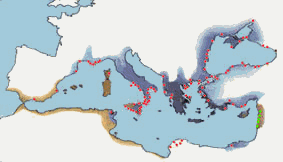
Contact with the Greek world has long been seen as significant in the development of indigenous societies across Europe. In recent years those studying European prehistory have questioned the importance of such external influences and have sought to explain cultural change through a variety of models more complex than simple cultural diffusion. At the same time, those working on Greek colonization have been re-evaluating the nature of the colonies. This project starts from this work on the colonies to provide a context within which to reconsider the influence of Greek culture on the development of Prehistoric and Protohistoric Europe.
Aims and Objectives
The aim of this project is to explore variation in the patterns of interactions between colonists and indigenous societies through a series of case studies. These will work at a variety of scales from the local and regional upward towards the pan-European. The research team will produce the local studies drawing on the results of recent work in a series of locations and working in collaboration with local scholars. We will examine ways in which Greek settlers integrated themselves into existing landscapes and created new ones, adapting and adopting existing material culture, settlements and monuments. We will look at the use and distribution of 'Greek' items of material culture (for instance painted pottery), including how they were used by the colonists; where, when and how they were adopted by indigenous societies and spread more widely. We will explore the differing regional responses to external contacts. The essence of this broader approach will be to explore changing spatial patterning in the archaeological data using Geographical Information Systems (GIS). We will confine our work to the integration of existing evidence without initiating new fieldwork or data collection. This approach cuts across traditional chronological and geographical boundaries. It builds on the full range of evidence (local, Greek and Phoenician) to provide a new way of approaching a central theme in European history, refocusing research on the roles of local communities.
The objectives of this project are therefore systematically to analyse three stages in the landscapes of the regions chosen using GIS:
- Pre-colonization: a long time perspective on the local context; ways in which the landscape is used and experienced (incorporating settlement, burial, ritual). How and when do these patterns change prior to Greek settlement?
- Early colonization: how do the Greek colonists react to their new environment? Do they integrate into the landscapes of the local populations— live in the same places, do ritual in the same spots, bury in the same places? Or do they immediately impose new ways of living in this environment? New sanctuaries, new areas of settlement?
- Established colonies: how does the colony develop? Is there a gradual or sudden change? How does the new landscape affect the landscapes of the local populations?
Symposium on Greek colonization
The Symposium was held in the Faculty 25-29 March, 2007, and brought together scholars whose work in the Mediterranean and Black Sea regions has improved our understanding of developments before and during Greek colonization. The presentations focused upon the use of landscape and interactions between Greeks and local populations.
Key issues discussed included new perspectives on cultural interaction, material-culture studies and the role of the physical landscape. The juxtaposition of the situations in the different areas of the Mediterranean and the Black Sea emphasized, in particular, the lack of a single uniform phenomenon of Greek colonization. This lack of homogeneity was a key discussion point in the closing discussions.
A copy of the programme can be downloaded here.
Contact:
- Leverhulme Trust Research Project, c/o Prof. M.Millett, Faculty of Classics, Sidgwick Avenue, Cambridge CB3 9DA
- colonization@classics.cam.ac.uk

